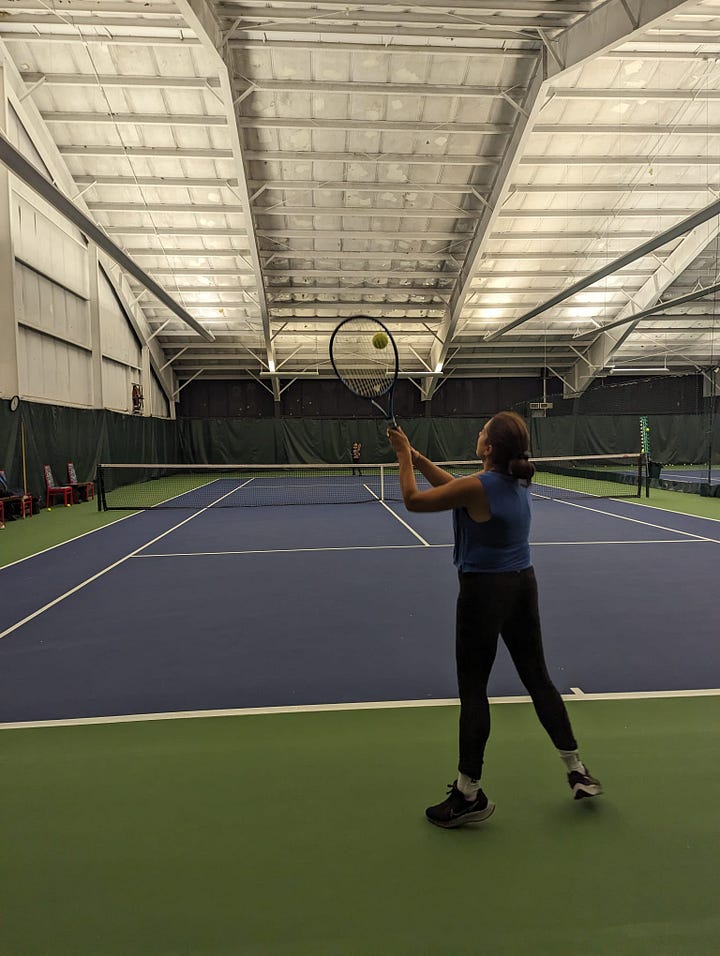Women Are Not Small Men
Most fitness advice wasn’t built for your body. Here’s what actually works in midlife.
I'm turning 50 this year. And my goal is to be the strongest I’ve ever been.
Not just emotionally strong—physically strong. Not thinner, not more toned. Stronger. Inside and out.
But here’s what I’ve learned: most of what we think we know about fitness wasn’t designed for women. The workouts. The nutrition plans. The recovery advice. Almost all of it comes from research on men. That means active women in midlife are often following a blueprint that doesn’t fit our bodies or our lives.
We’re doing more and seeing fewer results. We’re running on empty.
Dr. Stacy Sims said it best on my podcast this week: Women are not small men. And when we stop training like we are, everything changes.
Here are three shifts I’m making in routine after talking with her.
1. Train for strength, not sweat
For most of my life, I’ve been addicted to intensity. Barry’s Bootcamp. SoulCycle. Anything that left me drenched and depleted. I thought: more sweat = more results.
Stacy calls this the “gray zone.” You’re going too hard to recover, not hard enough to adapt. And for women in midlife, it’s a recipe for burnout—not strength.
These classes can be great for community, but you should also work these into your schedule:
Heavy resistance training to preserve muscle and build bone density
Jump training (yes, jumping) to boost skeletal strength
Mobility work to protect joints and prevent injury
That doesn’t mean going hard every day. It means training with intention. I still move my body daily but now I ask: is this helping me build strength or just burn myself out?
2. Eat to fuel, not to fix
For years, my mornings looked like this: wake up, chug coffee, rush into work. No breakfast. No real fuel. Just caffeine and willpower.
It felt efficient. Even disciplined. But what I didn’t realize is that I was running my body on fumes.
When I told Stacy this, she practically cut me off to say that’s what we need to stop doing.
Because here’s the truth—most nutrition advice we’ve absorbed was built around male physiology. That includes calorie targets, intermittent fasting windows, and protein needs. None of it reflects what’s happening in a woman’s body—especially in midlife.
During perimenopause and menopause, our metabolism shifts. Our cortisol levels are already elevated. Our muscle mass naturally declines. So when we skip meals, push through hunger, or under-eat, we’re not getting leaner—we’re getting weaker.
What actually works:
Start the day with protein—not just coffee. Aim for 30g at breakfast.
Eat carbs strategically—around workouts, when your body can use them.
Ditch the fasting window if it leaves you tired, foggy, or wired at night.
3. Recovery is work
I used to treat rest like a reward—something I earned by working myself to the brink. But recovery is the work.
Sleep. Stillness. Stress management. These aren’t extras—they’re what allow our bodies to adapt and grow stronger.
In midlife, this becomes even more essential. Hormonal shifts can mess with our sleep and spike our stress response. So if you’re feeling more exhausted than energized after workouts, it’s not your imagination. It’s your physiology.
Here’s what I’m doing differently:
A pre-bed routine that includes screen-free time and mental “filing”
Lower-stakes movement on off days (walking, stretching, breathwork)
Saying no to workouts that leave me wrecked instead of restored
The goal is not to grind—it’s to grow.
We are so used to being told to shrink.
Shrink your waist. Shrink your portions. Shrink your goals. Shrink your expectations of what midlife should look like.
But I don’t want to shrink. I want to feel strong.
I want to carry my kid and his suitcase through the airport without pulling a muscle. I want to move with confidence and energy. I want to wake up and feel good in my body—not confused or betrayed by it.
That’s not vanity. That’s vitality.
And it starts by unlearning what wasn’t built for us and rebuilding from the ground up.
Listen to the whole episode with Stacy here.
With love,
Reshma


While you’re here…
If you’re in Chicago this weekend: Come hear me interview former Prime Minister of New Zealand Jacinda Arden about her life and new book “A Different Kind of Power”. In it, she shares the remarkable story of how a Mormon girl plagued by self-doubt made political history and changed our assumptions of what a global leader can be.
From the New York Times: “The mental health of mothers in the United States declined significantly from 2016 to 2023, according to a large new study published in JAMA Internal Medicine on Tuesday.”
From my bookshelf: I just picked up Tina Knowles’ memoir, Matriarch. The cover is gorgeous and her story is even more so. Here’s a snippet from Elena Bergeron reporting on it, “It has the drama of her upbringing in the segregated South and the personal improvement journey of a working mom compelled to stand up for her kids but not herself, as well as cautionary optimism: Knowles reveals for the first time that she was diagnosed with stage 1A breast cancer in 2024. (After surgery and treatment, she is cancer free — and daring to dress in “sheer mesh” after undergoing a reduction. “That was my silver lining.”)”





You are so right Reshma: most advice wasn’t built for us. I’ve spent the past few years as an advisor and investor in women’s health, and the pattern repeats; biomarkers, trial protocols, care standards—all shaped around male physiology. It’s exhausting work educating and building the capital stack to close these gaps.
Thank you for putting this into words that land with both strength and softness. Would love to stay in touch. I think our paths may be more connected than they seem. 🧡
PS - I ditched the cardio some years ago and replaced it with strength training. Haven’t looked back!